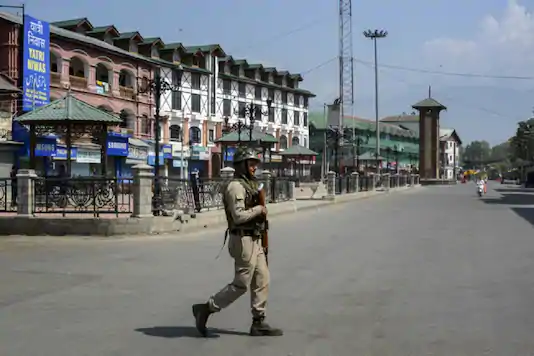
SOURCE: PTI
Fall in stone-pelting incidents and continued crackdown on separatist leaders in Jammu and Kashmir are key factors of a decreasing trend of violence since the abrogation of Article 370 last year, officials said on Monday.
A comparative analysis of the data gathered since the constitutional changes were made last year shows that separatists, who used to give call for strikes in Kashmir, are in disarray after the government continued to crack its whip by seizing their bank accounts and attaching assets allegedly amassed through terror funds, they said. On August 5 last year, the Centre abrogated the special status guaranteed to Jammu and Kashmir under Article 370 of the Constitution and bifurcated the state into Union Territories ? Jammu and Kashmir, and Ladakh.
There has been barely any bandh call during the last one year by separatist groups, which have virtually become non-functional after the government arrested their main leaders like Yasin Malik of JKLF in a 1990 case of gunning down IAF personnel and Shahbir Shah of Jammu and Kashmir Democratic Freedom Party (JKDFP) in a 2007 money laundering case. Sale of medical seats in Pakistan by separatist leaders also came to the fore during last year, officials said, adding that it left the public at large disgruntled.
Large gatherings at funerals of local militants came to an abrupt halt after the government changed the norms and did not identify the killed militants, the officials said, adding that in some cases, the terrorists were identified but the bodies were sent to unidentified graveyards, either at Baramulla or Ganderbal, and buried in the presence of their family members. Giving the statistics of the declining trend of violence, the officials said there were 532 incidents of stone pelting in 2018, 389 in 2019 and 102 in 2020.
The incidents of stone pelting were down by 27 per cent in 2019 in comparison to 2018 and 73 per cent in 2020. As many as 2,268 stone pelters were arrested in 2018, 1,127 in 2019 and 1,152 in 2020.
A total of 583 militants were arrested under the Unlawful Activities Prevention Act (UAPA) in 2018, 849 in 2019 and 444 in 2020, the statistics said. Fifty-eight Hurriyat leaders were also detained in 2018, 70 in 2019 and six in 2020, while 29 activists of the banned Jamaat-e-Islami (JeI) were detained in 2019 and eight in 2020.
The security cover, by way of residential guards, personal security officers (PSOs) and vehicles, has also been taken away from all separatist leaders since 2019. Action was taken against JeI and JKLF activists which included registration of 51 cases and arrest of 117 JeI activists, of which, 29 were detained under the Public Safety Act.
A total of 82 bank accounts involving Rs 70,44,073 were frozen and 19 premises housing JeI offices were raided during the course of investigation, it said. Besides the house of separatist leader Asiya Andrabi was attached in a UAPA case, with security agencies regularly monitoring and taking required action against terror funding and other cases pertaining to separatists.
As many as 173 cases registered under UAPA have been charge sheeted in courts in 2019 (140 cases) and 2020 (33 cases), according to the official estimate.






